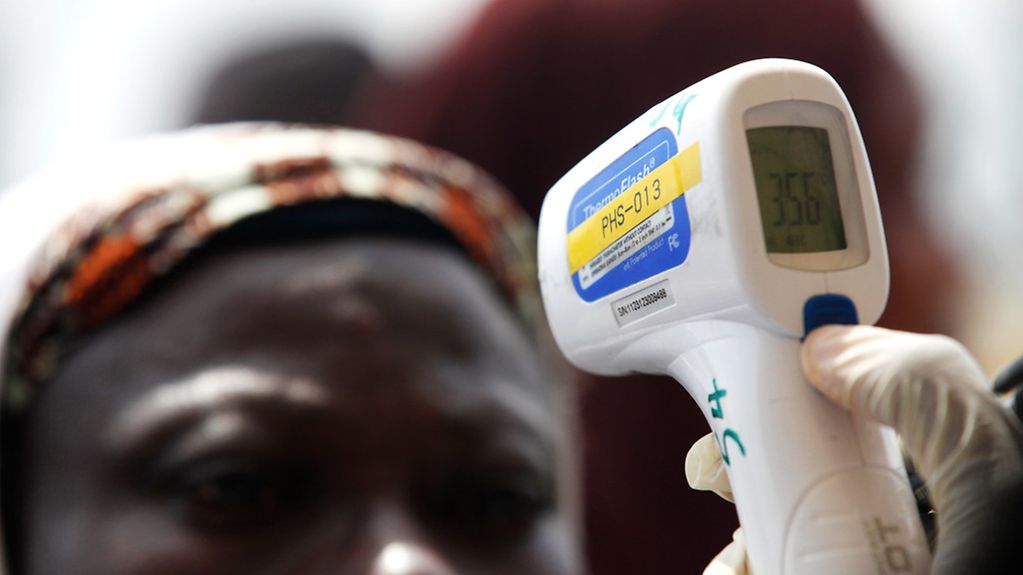Epidemic in West Africa
The German government has decided to take additional measures in the fight against Ebola. Significantly more than 4,000 volunteers for the Bundeswehr’s Ebola Task Force have now come forward in response to an appeal made by Federal Defence Minister Ursula von der Leyen.
4 min reading time

A huge number of helpers are needed to fight and prevent Ebola
Photo: picture alliance / AP Photo
More than 1,200 medical specialists have also volunteered.
The German government has been supporting the World Health Organization (WHO) and NGOs operating in the affected areas, including Médecins Sans Frontières, since the outbreak began.
Medical personnel for Liberia
The Federal Ministry of Health, the German Red Cross and the German Medical Association have called for volunteers to help fight Ebola in West Africa. "We are currently seeing dramatic trends in the Ebola epidemic, which is why the German government is helping the German Red Cross set up and run a mobile hospital in Sierra Leone and a centre to treat Ebola patients in Liberia," declared Federal Health Minister Hermann Gröhe.
In Sierra Leone an existing Ebola station run by the German Red Cross is to be expanded to provide space for 80 to 100 beds. Talks are ongoing with governments in the region and international partners to identify a suitable location for a German Red Cross hospital with a capacity of up to 220 beds.
More than 1,200 medical specialists have already volunteered. They are to be prepared for their mission in West Africa by the German Red Cross, which will run one-week preparatory courses. The plan is for staff to spend between four and six weeks in West Africa, before they are replaced by the next contingent. The German government has assured all volunteers that provisions are in place to ensure that they can be brought back to Germany in an emergency. Interested individuals can volunteer through the website of the German Red Cross (www.drk.de).
The German Red Cross would be happy to hear from interested doctors, midwives, physiotherapists, pharmacists, radiology specialists, laboratory technicians and nursing staff with the appropriate qualifications and a sound command of English.
The aim is to recruit medical staff to fight Ebola in Liberia. The Bundeswehr is to fly a field hospital with 50 beds to the region. Preparations are already ongoing, including procurement of equipment, and vaccinating and training volunteers.
German government steps up measures
In a letter to Members of the German Bundestag, the German government has once again underlined its will to help in the fight against the Ebola epidemic.
The joint letter was signed by Federal Foreign Minster Frank-Walter Steinmeier, Federal Interior Minister Thomas de Maizière, Federal Defence Minister Ursula von der Leyen, Federal Health Minister Hermann Gröhe and Federal Development Minister Gerd Müller. They lay out their key concerns and count on the support of all Parliamentarians. The State Secretaries of the ministries concerned will meet again to decide on further measures to fight the epidemic.
Federal government spokesperson Steffen Seibert once again laid out the measures taken by Germany to tackle Ebola:
- Walter Lindner, Ambassador of the Federal Republic of Germany in Venezuela, has been appointed Ebola Commissioner
- In conjunction with the French Army, the Bundeswehr plans to establish an air bridge to the countries affected by the Ebola outbreak at short notice and set up an air transport base somewhere in the wider region.
- The German government will support the German Red Cross in establishing and operating a mobile hospital with more than 200 beds as well as two primary healthcare clinics in the region.
- The German government intends to increase its staff of essential medical auxiliaries. It will put in place the conditions for a functioning rescue chain.
- The Federal Office of Civil Protection and Disaster Assistance will make extensive medical equipment available at short notice.
- The German government is prepared to use its development cooperation budget to support additional preventive measures as well as to provide medical supplies and food.
- The Federal Agency for Technical Relief will be involved in providing logistical support for aid measures both in Germany and in the region.
- The German government intends to play a greater role in the training of medical personnel in the affected countries.
No risk of Ebola spreading in Germany
Ebola is an extremely rare life-threatening infectious disease. In all probability fruit bats are the source of the virus, although this has not yet been definitively ascertained. Humans and animals can become infected if they come into contact with infected fruit bats. The disease is communicated through contact with body fluids of victims (e.g. vomit, blood or sweat).
Although the World Health Organization has declared an "international public health emergency", the population of Germany is not at risk. All the recommendations issued by the WHO for countries like Germany have been implemented. Should an Ebola patient arrive in Germany all preconditions are already in place to ensure safe treatment.